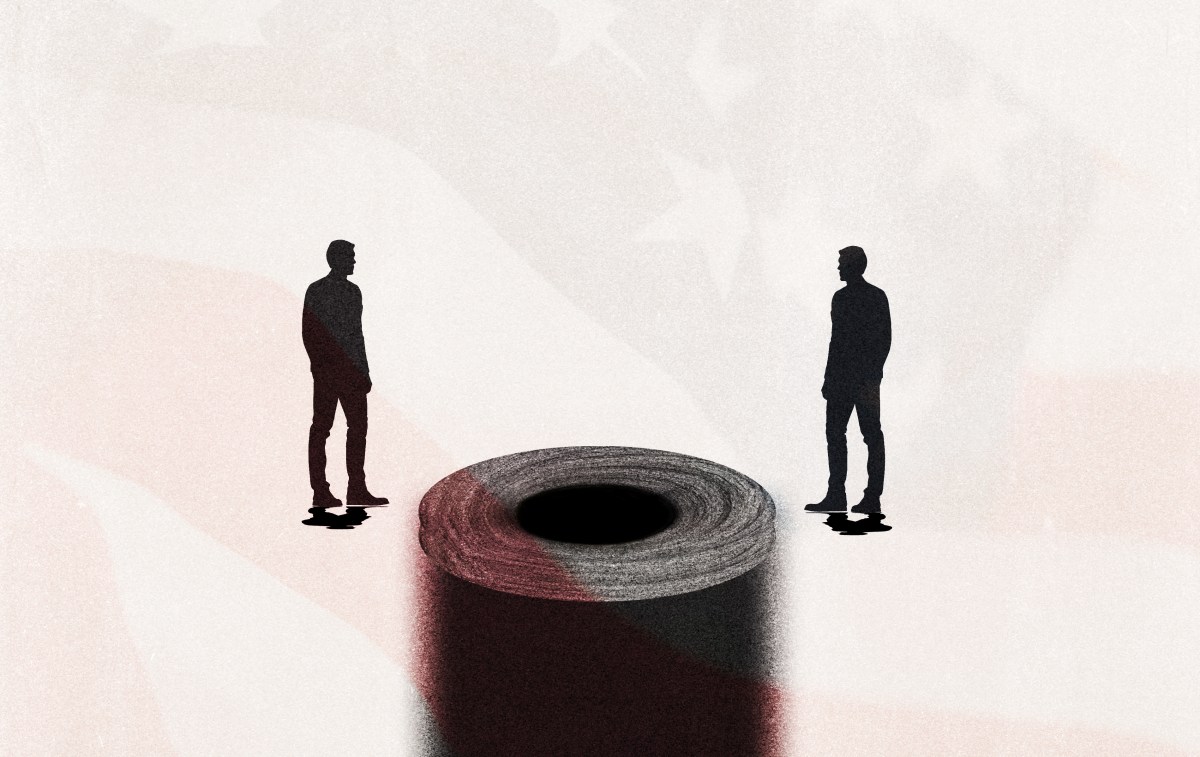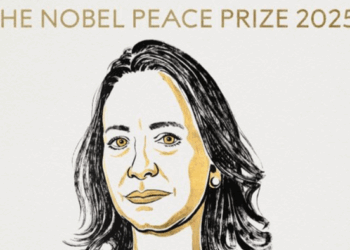Welcome back to Dispatch Faith.
As I wrote last week, the assassination of Charlie Kirk on September 10 is sweeping in magnitude. The last week has certainly proved it, with fighting among political and cultural adversaries—including the sidelining of late-night TV host Jimmy Kimmel. In this week’s newsletter, Kevin Brown argues that we shouldn’t lose sight of a more insidious enemy. Whatever the degree to which Kirk’s murderer was influenced by ideology on the left, it’s hard to argue with the contention that he was also lost in a sea of nihilism. That is: “No meaning to life, nothing to aim toward or organize around, no intrinsic worth or dignity to each person, and no standard of what is good, right, and true to guide and govern us,” Brown writes.
I think he’s exactly right. It’s this lack of belief in the good, true, and beautiful that leads us down the paths of perpetual power struggle, to thirsting for nothing beyond the will to power, and to a dark abyss. We must not lose sight of that as we search for answers to what ails us, Brown writes.
Kevin Brown: Our Real Enemy in the Culture Wars Is Nihilism

Few of my college classroom experiences left an imprint upon me, but I will never forget April 20, 1999—the day of the Columbine High School shooting. That evening, I had a three-hour “Juvenile Delinquency” class adjuncted by a social worker from downtown Indianapolis.
After a day of absorbing news of the massacre, my fellow students and I were eager to hear our instructor’s thoughts. He sighed heavily, shrugged his shoulders, and offered this unforgettable line: “It’s terrible. Truly terrible. And I see this same tragic violence and death every single day. The difference, however, is that what I see doesn’t make the news.”
His point is important. Violence is violence. And if humans have intrinsic worth and dignity, then the senseless, tragic death of one person is no worse than another.
Yet even amid the inescapable images of death and violence in our country, many have yet to experience an assassination of such a well-known figure as Charlie Kirk. Regardless of what one thought of his politics, the visibility of Kirk’s death, the ubiquity and magnitude of discussion thereafter, and its overall cultural impact have few 21st-century comparisons, particularly for younger generations.
While many were quick to denounce political violence and its threat to democracy, responses to the assassination predictably began to contour around familiar frameworks and political narratives. Kirk’s alarming death raises the bar of shock and anger in a century roiled by cultural conflict.
A culture war—but not the kind you think.
In the early 1990s, sociologist James Davison Hunter coined the expression “culture war” as he described a country divided between competing moral visions of orthodox traditionalism and cultural progressivism. We are still in a culture war, says Hunter, but of a different character. “[B]eneath the apparent polarization, beneath our seemingly incommensurable differences, we increasingly inhabit a common culture,” he writes. One that is “chillingly nihilistic.”
If Hunter is right, cultural battle lines cannot be neatly drawn between political typologies of left and right. In an After Virtue moment where, claims the late philosopher Alasdair MacIntyre, universal norms no longer derive from traditional moral authorities so much as feelings and preferences, nihilism comes to occupy the space once held by transcendence.
This, says Hunter, is the essence of our war.
Nihilism’s root is nihil, Latin for “nothing.” No meaning. Empty; soulless. What we see is all there is. Nothing else. Nothing beyond. Nothing more. Nothing. What is the meaning? What is gained? What is lost? What is the point? Nothing.
Decades ago, Pope John Paul II popularized the phrase “culture of death.” A culture of death is a culture of nihilism. No meaning to life, nothing to aim toward or organize around, no intrinsic worth or dignity to each person, and no standard of what is good, right, and true to guide and govern us. “Annihilation,” says Hunter, “is the point.”
We are still learning more about the motives of Kirk’s assassin, but, contends writer Freddy deBoer, his views were not formed around an earnest consideration of, and reaction to, competing intellectual ideologies. Perhaps he is better understood as a chaos agent whose malice was hardened in an ecosystem of resentment, spectacle, and unmoored grievance.
“[H]e had some sort of ideological urge, some sense that his violence should contain meaning, but his impulses and influences are incoherent,” writes deBoer. “[I]ndeed, that urge has been inculcated in online communities that are defined by nothing so much as, well, nothing … an endless race to the bottom of nihilism and self-hatred.”
Journalist Adrienne LaFrance describes this as “salad bar extremism”—a kind of bespoke radicalism where agents select elements of fringe ideologies or internet-fueled conspiracies to suit their belief structure, producing incoherent doctrine that fails to meaningfully map to an established set of political beliefs.
If deBoer is right, and LaFrance’s “salad bar extremism” shapes our understanding of this latest tragedy (and perhaps many others), the problem here is not just the presence of harmful ideology. It is the absence of productive ideology. It is nihilism, nothing.
And what, or who, is behind nothingness?
Who is shaking the jar?
There is a story attributed to Rabbi Yisroel Bernath where he describes placing 100 red fire ants and 100 black ants from the Southwest desert in a jar. At first, he says, nothing will happen. But if you aggressively shake the jar and dump the ants back on the ground, they will fight to the death.
The red ants think the black ants are the enemy. The black ants think the red ants are the enemy. But the real enemy is the person who shook the jar. The story is likely inaccurate. But, importantly, the illustration is meant to invite us to reevaluate our true adversary.
In C.S. Lewis’s 1942 book The Screwtape Letters, a senior demon coaches his nephew on how to demonize human subjects. To corrupt the soul of a person, he says, the apprentice demon must get his subjects to misidentify the enemy. Using satirical fiction, Lewis was warning readers not to confuse our real foe.
If nihilism and evil are our true enemy, and if that is the essence of our battle, has our angst and anger been diabolically diverted in this present moment of violence? Who is shaking the jar?
Consider just a few examples.
In a recent interview, technology ethicist Tristan Harris suggests the incentive scheme of an attention economy stokes and amplifies the worst of our pathologies. “[W]hen we are addicted, outraged, polarized, anxious, misinformed, validation seeking, and not knowing what’s true,” he says, “[we are] success cases of a business model that was trying to get … attention.” In other words, when we are most dysfunctional, it is because of and not in spite of someone’s business model.
The modern playbook for mobilizing others is to sow seeds of fear and harvest actions in service of someone else’s agenda. Such ground is fertilized, writes 20th-century philosopher Hannah Arendt, under conditions of isolation. Loneliness, she says, heightened in an antisocial century, “prepares men for totalitarian domination.” Related, Kyla Scanlon writes, “Anxiety creates the psychological conditions that algorithms exploit.”
Author Rodney Clapp describes the “deification of dissatisfaction” that characterizes much of modern marketing. Related, James Clear, author of Atomic Habits, says, “You can go to hell without moving an inch, just focus on what you lack.”
The New Testament book of James tells us, “Those conflicts and disputes among you, where do they come from? Do they not come from your cravings that are at war within you? You want something and do not have it … ”
If we are always convinced that a superior and preferable state of affairs is within our reach, how could we ever be satisfied, content, and happy?
Modern politics seems more concerned with predicting how the end of the world would unfold “if the other side wins” instead of offering a real and earnest vision of the policies and prescriptions necessary to advance our country’s future.
But does that really reflect the median American’s perspective? A Carnegie study from 2023 discovered that American voters are actually less ideologically polarized than they think they are. Yet, according to the study, even though Americans are not as ideologically polarized as they believe themselves to be, they are emotionally polarized. We don’t just disagree with each other, we hate each other, even though our political values are much closer than our emotions would suggest.
So, who is shaking the jar?
This is not just a public problem. As an employee for Asbury University, I was amazed at the broad range of negative responses to the 2023 revival there from self-described Christians. A Google search will return infinite complaints and unfounded accusations of emotionalism, gimmicks, and coordinated planning parading as an organic spiritual movement. Some videos have even suggested this student-centered revival was “of the Devil.”
What? Why was the most unified, God-honoring, apolitical, hungry-hearted, confessional, prayer-saturated, repentant, and graciously hospitable mass gathering at that point in the 21st century met with pockets of cynicism or hostility—not outside, but within the faith?
For 16 days, I saw the best of Christ-followers. I saw men and women of all ages, ethnicities, cultures, languages, and classes—unified in fervent worship. I saw countercultural humility, sacrificial hospitality. I saw the loosened chains of a younger generation weary and unsatisfied with the empty scripts handed to them, desirous of something more. All that mattered seemed to be a right relationship with God and a right relationship with others. There was spiritual hunger, and hunger met.
Whatever else we may conclude, this is praiseworthy. Why wasn’t there uniform celebration from Christians?
Years ago, Duke theologian Stanley Hauerwas was invited to offer a prayer at a university luncheon event. He was counseled to provide a “civil prayer” so as not to offend anyone present. In that respect, they asked the wrong person. He opened his prayer by saying, “Dear God, we do not fear you, since we prefer to fear one another.”
He was right. Christian faith often reflects a rivalry of grievance. How?
Fighting nothing with something.
When unity is lost, when our bonds crumble, when we literally dis-integrate—who gains? Yes, promoters, programmers, platformers, propagandists, and politicians gain. But who else benefits, spiritually speaking?
I think we are in a war. And there are forces corrupting our souls and stirring our angst–shaking the jar. But let us not misidentify the enemy, which must be named: evil, sin, meaninglessness, and nihilism. Nothing.
So, what do we do? How do we fight? Specifically, how do we fight nothing?
We fight nothing with something. Christians point to something—they point to Someone.
In the Gospel of John Chapter 6, the crowd following Jesus began to leave him. His teaching was hard. They did not like his absolutist claims. He failed to meet their expectations of the coming Messiah. Jesus asked the 12 disciples if they, too, wanted to leave. “Lord, to whom can we go?” responded the Apostle Peter. “You have the words of eternal life.” The most powerful response to nothingness is that which is eternal. Nihilism must not, will not, have the last word. Echoing Peter, Christians ultimately believe meaning, hope, and life are found in a person.
Nadya Williams: We Weren’t Made to Eat Alone
One of the antidotes to nihilism is service to others, which is the subject of Nadya Williams’ essay today on our site. The joy of church potlucks and meal trains is the essence of community—a concern for the other that reminds us we were not made to eat alone.
There is a reason the early church referred to such potlucks as “love feasts”—none of this could happen without love. When my then 5-year-old overly enthusiastically enjoyed a particular dessert one Sunday, a few weeks later the friend who had prepared it made it again—with my child in mind. In this way, the preparation of food for communal gatherings is something not just practical but prayerful, as it brings us closer to seeing someone as they are in God’s eyes—unconditionally precious, lovely, and possessing genuine opinions, preferences, and needs. Indeed, sometimes people will say to someone outright: “I prayed for you as I was baking.”
But the hospitality of church potlucks extends far beyond the doors of the church and Sunday mornings. At any given moment, a meal train or several are connecting church members to a person or family in need—someone housebound because of illness, or a family grieving the loss of a loved one. Then there are more joyful reasons for these meal trains, such as the arrival of a new baby. These are my absolute favorite occasions, I confess. Rejoicing with families over new arrivals and sharing the table with them through bringing a meal is a delight.
This has been a hallmark of the Christian church from its earliest days—drawing attention for the way it countered so much of Roman culture:
When early Christians gathered together—free and slave, men and women—to eat the same food and drink the same drinks, as we hear of them doing already in the book of Acts, they were breaking fundamental social taboos of the Roman world. In a Roman banquet, seating arrangements were decided by social rank. Food and drink were then served by rank as well, from best to worst–meaning the highest ranked were served first, and they also got the best quality of food and drink. Roman society was hierarchical and well-ordered: Every person knew his or her place. The most serious criticism we hear of the Lord’s Supper in the New Testament—Paul blasting the Corinthians who allowed some to get drunk and others to go hungry during the communal meal—is describing what would have been perfectly typical behavior for a Roman feast. But it was not what should happen at the Christian love feast.
Indeed, the original Greek word for fellowship that occurs in the New Testament—koinonia—bears hints of this sense of otherworldly community already. Originally a political term that occurs in such Greek political writers as Aristotle, koinonia referred to the obligations citizens had for their city-state. A related term, koinon, referred to military and diplomatic federations of states. The root meaning always denoted something shared, held in common. So we see the idea of church fellowship as the sharing of meals and companionship together. But, of course, there is a difference between the world of the Greek city-states and the Roman Empire that eventually absorbed them. Among other political terms the church had borrowed from the Greek city-states is the very word we use for church—ekklesia, which originally meant citizen assemblies. Except, only adult males who could afford their own armor could be members of these assemblies, just as they alone were part of the original koinonia. When the church adopted these terms to refer to its gatherings of all people—men and women, slave and free—it was a not-so-subtle proclamation: Our kingdom is not of this world.
More Sunday Reads
- For the journal Mere Orthodoxy, theologian James R. Wood argues that Christians grieving Charlie Kirk’s murder must not move forward seeking vengeance—via the long arm of the state or otherwise—and instead regard cultural enemies with a “redemptive imagination.” Wood draws on the practical examples of Augustine of Hippo: “Augustine is not naïve; he admits we have enemies in this life. We owe them a ‘perfect hatred,’ in the words of the Psalmist. (See Augustine’s engagement with this biblical text in Expositions of the Psalms 138.28. See also The Confessions, V.12.22; The City of God, XIV.6; Homilies on the Gospel of John 87.4.) But Augustine explains what this entails: the one who loves God ‘owes a perfect hatred to those who are evil—that is, he will neither hate the person because of the fault nor love the fault because of the person, but will rather hate the fault and love the person.’ Christians are to love their enemies as potential brothers, envisioning them not only as they are in their opposition to God but as they might become by God’s grace. Just as a craftsman looks at a rough piece of wood and sees the finished work, Augustine exhorts believers to look at their enemies with redemptive imagination. This, Augustine says, is how God loves sinners. ‘So too regard your enemy,’ he urges. To love him is to pray that God would forgive and transform him. We do not love his present opposition, but what we want him to be: one who loves God with us and his neighbors—including us.”
- Rosh Hashanah, the Jewish new year, begins this week. For The Conversation, Sarah Pessin writes about one of the key tools in observance: the shofar, an animal horn fashioned into an instrument. “The holiday is a time of communitywide soul-searching. Beyond marking the Jewish new year, it also commemorates the world’s birthday, the creation of humans, and the sovereignty and majesty of God. Marking the start of the High Holiday season, Rosh Hashana kicks off a 10-day period of reflection that culminates in Yom Kippur, the Day of Atonement, whose last moments are also marked by the shofar’s call,” she writes. “Rabbis say the shofar’s sounds cause God to move from his ‘throne of judgement’ to his ‘throne of mercy.’ They also say that shofar sounds can penetrate human hearts, prompting them toward repentance – while mimicking the broken-hearted cries of someone recognizing just how much they need to repent.” Then later: “According to the Book of Genesis, God commanded Abraham to sacrifice Isaac, his beloved son. After nearly going through with the killing, Abraham has a heavenly vision in which he is thanked for his loyalty to God and instructed to spare Isaac after all. Abraham sees a ram caught in a nearby thicket, which he sacrifices to God instead. The next verses describe God blessing Abraham and all his future descendants – which Jews read as a key moment in their identity as a people. In the Talmud and across a number of other Jewish texts, blowing a ram’s horn for the new year invokes this same redemptive energy: God’s willingness to watch over not just Abraham and Isaac but the entire Jewish community, in a spirit of mercy and blessing.”
Religion in an Image


















